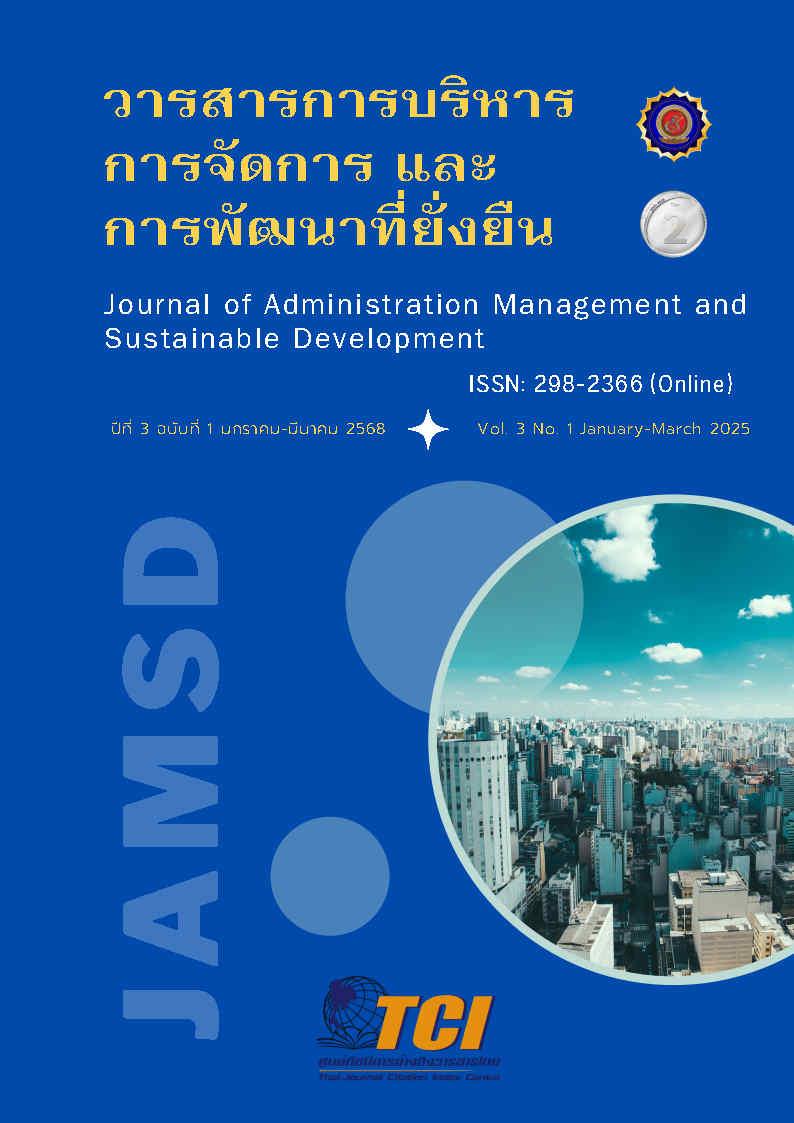Academic administration of private schools in the artificial intelligence era
Keywords:
academic administration, private school, artificial intelligence eraAbstract
The academic article “Academic Administration of Private Schools in the Artificial Intelligence Era” aims to explore the concepts and theories related to the AI era and the academic administration of private schools, examine the role of artificial intelligence in the academic administration of private schools, and propose academic administration guidelines for private schools in the AI era. The study employs a literature review and document analysis of relevant research and studies. The findings reveal that 1. the AI era has created impacts, benefits, and transformations in multiple dimensions of human life. 2. The concepts and theories related to academic administration in the AI era include data-driven decision-making, strategic management, personalized learning, adaptive learning, evidence-centered design, and ethical considerations. The role of artificial intelligence in academic administration within private schools consists of curriculum development and learning processes, student registration, assessment and evaluation, subject group and student development activity management, quality assurance in education management, innovation and educational technology development, library and learning resource management, and curriculum networking and instructional management. 3. The academic administration guidelines for private schools in the AI era consist of 4 guidelines for curriculum development and learning processes, 4 guidelines for student registration, assessment, and evaluation, 3 guidelines for subject group and student development activity management, 3 guidelines for promoting quality assurance in education management, 4 guidelines for fostering innovation and integrating educational technology, 4 guidelines for library and learning resource development, and 4 guidelines for establishing curriculum networking and instructional management. They are presented in sequential order.
References
แคทรียา แสงใส. (2566). ปัญญาประดิษฐ์กับการพัฒนาทางการศึกษา. Journal of Applied, 1(3), 49-60.
พรพิมล รอดเคราะห์. (2564). ผลของเกมดิจิทัล การศึกษาเพื่อส่งเสริมความรู้ด้านความฉลาดทางดิจิทัล สำหรับนักเรียนระดับชั้นประถมศึกษา. วารสารศิลปากรศึกษาศาสตร์วิจัย, 13(1), 440-457
วรรณี สุจจิตร์จูล, นลินทิพย์ คชพงษ์, อุบลรัตน์ ตรีพงษ์พันธุ์, กฤติยา คงแท่น และสุพจน์ เฮงพระพรหม. (2565). ผลการใช้นวัตกรรมการเรียนรู้ด้านปัญญาประดิษฐ์สำหรับเด็กประถมศึกษา. วารสารสังคมศาสตร์และมานุษยวิทยาเชิงพุทธ, 7(10), 327-338.
วัชรพล ยงวณิชย์. (2565). มนุษย์ ปัญญาประดิษฐ์ และองค์การ: วัฒนธรรมและสมดุลของการอยู่ร่วมกัน. วารสารวิชาการมนุษยศาสตร์และสังคมศาสตร์ มหาวิทยาลัยราชภัฏธนบุรี, 5(3), 135-138.
ศิรประภา โภชนจันทร์, ชัยณรงค์ สุวรรณสาร และกาญจนา ภัทราวิวัฒน์. (2562). รูปแบบการบริหารจัดการโรงเรียนเอกชนภายใต้กรอบยุทธศาสตร์ชาติ 20 ปี. วารสารสันติศึกษาปริทรรศน์ มจร, 7(2), 513-526.
สว่างนภา ต่วนภูษา. (2567). ปัญญาประดิษฐ์เพื่อการบริหารการศึกษายุคดิจิทัล. วารสารการบริหารการศึกษาและมนุษยสังคมศาสตร์, 2(3), 52-56.
สำนักงานเลขาธิการสภาการศึกษา. (2565). การจัดการศึกษาขั้นพื้นฐานโรงเรียนเอกชน: สภาพและแนวทางการสนับสนุน. บริษัท พริกหวานกราฟฟิค จำกัด.
Barrot, J. S. (2023). Using ChatGPT for second language writing: pitfalls and potentials, Assessing Writing, 57, 100745.
Chen, L., Chen, P., & Lin, Z. (2020). Artificial intelligence in education: A review. IEEE Access, 8, 75263–75278.
Farrokhnia, M., Banihashem, S.K., Noroozi, O. & Wals, A. (2023). A SWOT analysis of ChatGPT: Implications for educational practice and research. Innovations in Education and Teaching International, 61(3), 1-15.
Fidan, M. (2024). Happy student in the age of artificial intelligence. Artificial Intelligence Theory and Applications, 4(1), 57–75.
Gao, J., Galley, M., & Li, L. (2019). Neural approaches to conversational AI: Question answering, task-oriented dialogues and social chatbots. Now Foundations and Trends. https://doi.org/10.48550/arXiv.1809.08267.
Gibson, D., Kovanovic, V., Ifenthaler, D., Dexter, S., & Feng, S. (2023). Learning theories for artificial intelligence promoting learning processes. British Journal of Educational Technology, 54(5), 1125-1146.
Gonçalves, B. F. (2024). Integration of artificial intelligence in teacher training: Training to innovate in the digital age. Proceedings of the International Conferences on E-Learning and Digital Learning 2024 and Sustainability, Technology and Education 2024, 161–173.
Gunawan, K. D. H., Kaniawati, I., & Setiawan, W. (2021). The responses to artificial intelligence in teacher integrated science learning training program. Journal of Physics: Conference Series, 2098(1), 12034.
Gupta, P., Sreelatha, C., Latha, A., Raj, S., & Singh, A. (2024). Navigating The Future of Education: The Impact of Artificial Intelligence on Teacher-Student Dynamics. Educational Administration: Theory and Practice, 30(4), 6006-6013.
Gökçearslan, Ş., Tosun, C., & Erdemir, Z. G. (2024). Benefits, challenges, and methods of artificial intelligence (AI) chatbots in education: A systematic literature review. International Journal of Technology in Education, 7(1), 19–39.
Isiaku, L., Muhammad, A. S., Kefas, H. I., & Ukaegbu, F. C. (2024). Enhancing technological sustainability in academia: Leveraging ChatGPT for teaching, learning and evaluation. Quality Education for All, 1(1), 385–416.
Javaid, M., Haleem, A. & Singh, R. P. (2023). ChatGPT for health care services: An emerging stage for an innovative perspective, BenchCouncil Transactions on Benchmarks, Standards and Evaluations, 3(1), p. 100105.
Kamalov, F., Santandreu Calonge, D., & Gurrib, I. (2023). New era of artificial intelligence in education: Towards a sustainable multifaceted revolution. Sustainability, 15, 12451.
Karakose, T., & Tülübaş, T. (2024). School leadership and management in the age of artificial intelligence (AI): Recent developments and future prospects. Educational Process: International Journal, 13(1), 7-14.
Kerrigan, S., Feng, S., Vuthaluru, R., Ifenthaler, D., & Gibson, D. (2019). Network analytics of collaborative problem-solving. In Proceedings of the 16th International Conference on Cognition and Exploratory Learning in Digital Age (CELDA 2019). Nov 7-9, 2019. pp. 43– 50. Cagliari: Italy.
Kohler, K. (2024). You only need to change your direction: A look at the potential impact of ChatGPT on education. Technology in Language Teaching & Learning, 6(1), 1–18.
Liang, X., & Luo, J. (2024). Integration of ChatGPT into project-based learning: A course design framework. International Journal of Chinese Language Teaching, 5(1), 29–46.
Lin, X., Chan, R. Y., Sharma, S., & Bista, K. (2024). ChatGPT and global higher education: Using artificial intelligence in teaching and learning. STAR Scholars Press. https://doi.org/10.32674/rh27qv16.
Mello, R. F., Freitas, E., Pereira, F. D., Cabral, L., Tedesco, P., & Ramalho, G. (2023). Education in the age of generative AI: Context and recent developments. CESAR Innovation Center. https://doi.org/10.48550/arXiv.2309.12332.
Stone, P., Brooks, R., Brynjolfsson, E., Calo, R., Etzioni, O., Hager, G., Hirschberg, J., Kalyanakrishnan, S., Kamar, E., Kraus, S., Leyton-Brown, K., Parkes, D., Press, W., Saxenian, A., Shah, J., Tambe, M., & Teller, A. (2016). Artificial Intelligence and life in 2030: One Hundred Year Study on Artificial Intelligence: Report of the 2015–2016 Study Panel. Stanford University.
Parker, L., Carter, C., Karakas, A., Loper, A. J. and Sokkar, A. (2024). Graduate instructors navigating the AI frontier: The role of ChatGPT in higher education. Computers and Education Open, 6, 100166.
Rane, N. L. (2024). Enhancing the quality of teaching and learning through Gemini, ChatGPT, and similar generative artificial intelligence: Challenges, future prospects, and ethical considerations in education. TESOL and Technology Studies, 5(1), 1–6.
Sasikala, P., & Ravichandran, R. (2024). Study on the impact of artificial intelligence on student learning outcomes. Journal of Digital Learning and Education, 4(2), 145–155.
Siemens, G., & Long, P. (2011). Penetrating the fog: Analytics in learning and education. Educause Review, 46, 30–32.
Su, J., & Zhong, Y. (2022). Artificial Intelligence (AI) in early childhood education: Curriculum design and future directions. Computers and Education: Artificial Intelligence, 3, 100072.
Swiecki, Z., Khosravi, H., Chen, G., Martinez-Maldonado, R., Lodge, J. M., Milligan, S., Selwyn, N., & Gašević, D. (2022). Assessment in the age of artificial intelligence. Computers and Education: Artificial Intelligence, 3, 100075.
Tammets, K., & Ley, T. (2023). Integrating AI tools in teacher professional learning: A conceptual model and illustrative case. Frontiers in Artificial Intelligence, 6.
Walter, Y. (2024). Embracing the future of artificial intelligence in the classroom: The relevance of AI literacy, prompt engineering, and critical thinking. International Journal of Educational Technology in Higher Education, 21(15). https://doi.org/10.1186/s41239-024-00448-3.
Whalen, J., Grube, W., Xu, C., & Trust, T. (2025). K-12 educators’ reactions and responses to ChatGPT and GenAI during the 2022–2023 school year. TechTrends, 69, 125–137. https://doi.org/10.1007/s11528-024-01028-y.
Zhu, G., Fan, X., Hou, C., Zhong, T., Seow, P., Chen, S.-H., Rajalingam, P., Yew, L. K., & Poh, T. L. (2023). Embrace opportunities and face challenges: Using ChatGPT in undergraduate students' collaborative interdisciplinary learning. National Institute of Education (NIE), Nanyang Technological University.






